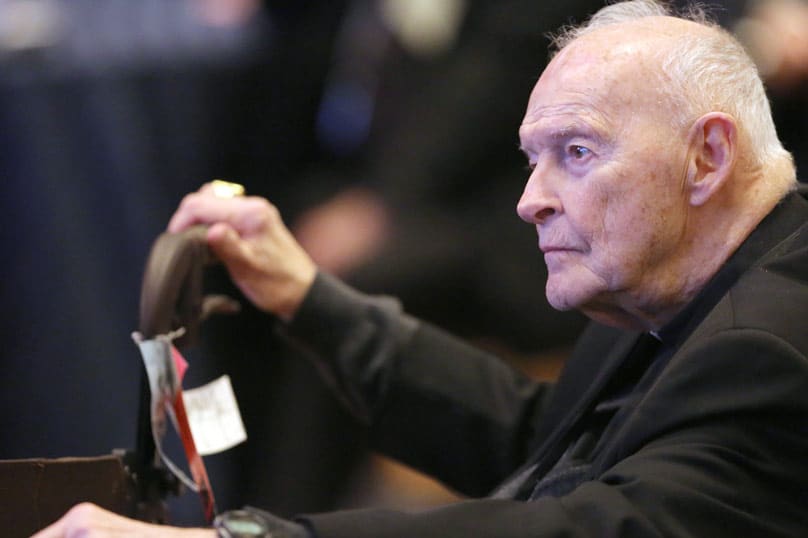
If anyone were to need any assurance of the truth of the old Latin proverb that the corruption of the best is the worst, they need only have looked to the events of the last few weeks surrounding former US Cardinal William McCarrick, whose resignation from the College of Cardinals was accepted by Pope Francis on 28 July.
The resignation was, in effect, a firing by Pope Francis after numerous key Church leaders in the US publically acknowledged in recent weeks that allegations of sexual abuse by then-Father, then-Bishop and then-Archbishop McCarrick were not merely limited to one allegation from several decades ago but were, in fact, multiple and “credible.” Although the former Cardinal is yet to face a canonical trial on the allegations, the language of numerous US Church leaders such as Cardinal Sean O’Malley of Boston, ground zero for sexual abuse in the Catholic Church in the US, leaves little doubt that virtually the entire leadership of the Church in the US is convinced the allegations are essentially true.
A major aspect of this shockwave were the reports that, over several decades, Cardinal McCarrick’s activities were known about, variously reported to key Church leaders by concerned Catholics including fellow clergy, as well as to the Vatican’s official representative in the United States (in an effort to head-off his appointment as Archbishop of Washington), yet Cardinal McCarrick remained immune from investigation.
At the same time he was leading the Church in Washington, regarded as a key archdiocese because of the influence conferred by its proximity to the nation’s centres of power, at least one financial settlement was reached with a victim in a previous diocese he had formerly headed. A second took place shortly after he canonically resigned as Archbishop of Washington due to reasons of age in 2006. It also seems clear that as Archbishop of Washington former Cardinal McCarrick serially pursued and molested seminarians using his power to coerce sexual favours and subtly threaten their futures should they speak out and had done so throughout his career. It is now believed that his first victim as a priest was also the first child he baptised.
Meanwhile, McCarrick was an ascendant force in the Church in the US for decades, highly influential in the naming of episcopal appointments, and was regarded as a key architect of the response of the Catholic Church in the US to the phenomenon of sexual abuse within its ranks.
At the same time, he was feted by influential media such as The Washington Post which, in 2002, glowingly described him as “The Vatican’s Man of the Hour” and reported him as the leading spokesman for the US bishops in their meetings with St John Paul II on the sexual abuse crisis. All the while, the attempts by victims and those who believed them to raise the alarm bells were met with a wall of episcopal and bureaucratic silence in a Church which had been proclaiming for years that it was deeply engaged in addressing the abuse phenomenon. To call the McCarrick case ironic, would be a serious – in fact, fatal – understatement.
The question which may now reasonably be asked is what effect will the revelations of former Cardinal McCarrick’s history as a sexual predator now have on the Church in the US and further afield? There are now convincing grounds to believe that the effects will be experienced for decades to come because they are not only limited to the tragedies of individual cases but have a national effect as well.
For decades, numerous ordinary Catholics as well as the US Church’s intelligentsia chose to stick with the Church in their country despite the pain of the abuse crisis. In the end, they accepted that the painful purification would lead to something better.
They believed the US bishops and trusted them when they said they were addressing the issue. However it is now perfectly clear that the white hot, palpable anger from almost all quarters against the US hierarchy and its associated bureaucrats driving the response to abuse shows that that belief is completely gone. Huge sections of the Church in the US feel utterly betrayed and are publically saying so – in effect signalling that the US bishops have lost the trust of the laity. It seems unlikely that the present generation of the Church’s leadership in that country will be able to recover it.
The wider damage is not limited to the baptised. With significant sections of US life already disposed to view Catholicism as a suspicious alien bacillus, and with the damage already caused by two decades of the abuse crisis, the McCarrick case has undoubtedly hardened public cynicism towards Catholicism and the Church exponentially.
For decades every pope since Blessed Paul VI has urged a new evangelisation of society – in effect a renewed missionary impulse from the heart of the Church proposing God’s love as an answer to the emptiness of an increasingly directionless modernity. The McCarrick case has clearly set the progress of the new evangelisation in the US back, probably by decades.
As comment swirled around last week’s revelations, commentators debated whether or not Pope Francis should move to laicise McCarrick. We do not see any reason why there should be debate at all. Given the tragic hurt done to victims and the damage done to the faithful laity and clergy of the Church … the real question must surely be why not?
